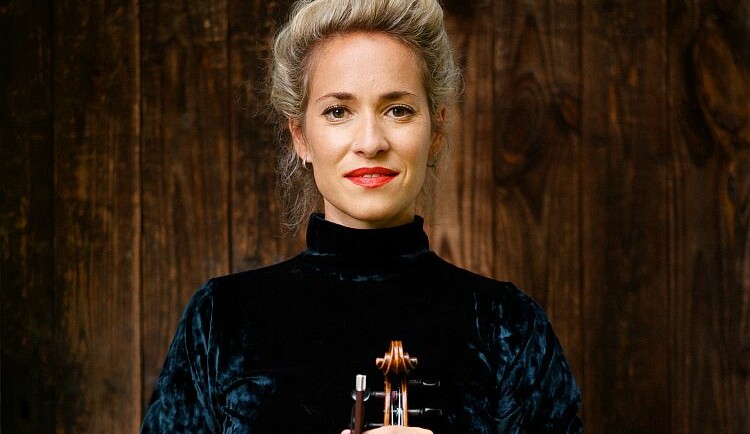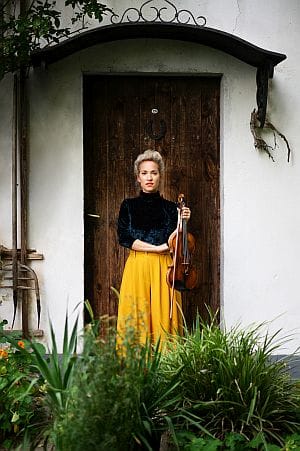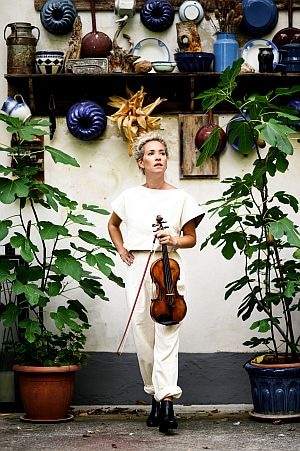
The violinist, singer and composer JULIA LACHERSTORFER, who has been causing a stir with her band ALMA for years now, released her solo debut in mid-October, “Spinnerin [a female narrative]” (Lotus Records). On this album the Upper Austrian-born artist one can hear something that has not been heard before, at least not in this country’s regions: folk songs that tell their stories from a female perspective. The artist, who was awarded the HUBERT VON GOISERN CULTURAL PRIZE, visited women of the older generation, listened to their life stories and translated them into songs that, through a haunting form and an elaborate sound, grow into a real listening experience. In an interview with Michael Ternai, JULIA LACHERSTORFER talked about the making of this very special album, her doubts that accompanied her during this process, and the new experience of having performed on her own.
The album is interesting in two ways. For one, it’s your first solo album and secondly, you are approaching the topic “folk song” from a perspective that hardly seemed to exist in this country until now, or even not at all, and your perspective is a female one at that. What made you decide to use this as the defining content of your album?
Julia Lacherstorfer: Over the last few years – especially since I started to turn to this music professionally – I’ve been looking for folk songs in their traditional and pure form again and again. I wanted to incorporate them into my music and combine them with my compositions. For this reason, I’ve started to search for pieces in local songbooks, with which I can identify myself as a female person on stage, and I’ve found a few very beautiful ones! But the thing was, I really had to search intensively and for a long time.
Two years ago I suddenly understood why it’s so difficult for me to find such suitable songs for me. I realized that it’s mainly the content of the songs that bothers me: a song can be very beautiful, but I often can’t use it because it just doesn’t make sense to me, it just doesn’t fit when I’m singing that I’m going to the alpine pasture now and my lass is waiting for me there.
These lyrics just don’t correspond to my life reality. Such songs are conveying a role cliché and are telling a male story, and there are an infinite number of them. Those that tell a story from a female point of view and don’t just serve a cliché are very rare. This fact then sort of set the theme for my solo project.
“I’ve always wondered why whole songbook series aren’t available on this topic”
Were you surprised after your research that there really are so few folk songs from the perspective of women? And how do you explain that?
Julia Lacherstorfer: From an ethnomusicological point of view, I can’t answer that in an adequate way now. I can only tell you what I believe. For example, there’s a really nice song about a woman going to the well every day to see if her lover has returned from the war. I got to know this song through my father and I recorded it too with Ramsch & Rosen for their first CD. The song’s theme touches me deeply, because it describes such a stirring situation. I’ve always wondered why whole songbook series aren’t available on this topic.
I can imagine that it has to do with the fact that – when folk music research began in Austria – most of the researchers were men and the informed persons they visited and interviewed were probably men too. In addition, the image of women 60 to 100 years ago was quite different. We know that at that time women in general were not yet believed to be capable of that much, or that in Freudian psychoanalysis, for example, a picture of them was drawn that today would make you tear your hair out. As if it were a scientific fact that women have a less developed brain.
Such theories are alive for a very long time and somehow always play into it. And I believe that this is one of the reasons why the researchers then did not really feel obliged to ask women what they had to say on this subject. But as I said, this is only a guess.
For your album you went searching for stories of women and also interviewed some women of the older generation. What did you draw from these interviews?

Julia Lacherstorfer: I found these interviews to be very inspiring and touching. During the interviews I never asked the women about anything specific, but simply let them tell their life stories. For example, I met Maria Salomon, a 92-year-old woman, with whom I talked for at least three hours. The song “Queen Solomon” is based on her story.
She told me how she grew up, that she lost her parents very soon in the war and where she ended up. It was so fascinating because she does not fit any role model or cliché of women. She never married because the few men she could have had were all killed in the war. After that, she simply never met anyone else who would have been suitable for her. Mrs. Salomon is very, very educated and has traveled a lot, and she’s a passionate radio Ö1 listener, is extremely independent and open-minded and still lives on her own: truly an extremely cool woman.
What I really found incredibly fascinating about our conversation was that she actually always felt it was unfair – even as a child – that she always had to clean her father’s shoes, just because she was a girl.
Or that her father was always the first to be served dinner, or that whenever a piece of heart was available, he got it, although she liked it so much; she only got it if her father didn’t want it, but her mother would never have offered it to her. These stories are an expression of the contempt for the female sex that exists even within a family.
To hear that being said by a now 92-year-old was very refreshing, because you often hear such things being justified, like, that’s just the way it was and the men didn’t mean it anyway. This reflection of hers fascinated me quite a bit.
“I simply tried to put myself inside the language of women of this generation”
How much of a challenge was it to translate the stories of these women into your own words and make them sound authentic?

Julia Lacherstorfer: Regarding the songs based on the interviews, it was difficult for me to filter out one minute of essence from a two-hour conversation. I handed this over to my producer Caitlin Smith, because she had a distance to the interviews and thus a much more differentiated view. For the songs with my lyrics, the fact that I grew up in the country and with dialect spoken by and around me helped me a lot, and I still can hear the way my grandparents spoke. The first song of the album was also written in thought of my grandma: I just imagined how she would express what I felt, using very simple sentences, not pompous at all. I simply tried to put myself inside the language of women of this generation.
How did you come upon the title “Spinner”? What is it about? Somehow this word makes me think of fairy tales.
Julia Lacherstorfer: I grew up with a lot of fairy tales from the Alps. They accompanied me during my childhood, also because my parents used to play a lot with the Upper Austrian storyteller Helmut Wittmann, and we were always there as children. While studying at the Anton Bruckner Private University in Linz, I wrote a bachelor’s thesis in which I examined alpine fairy tales in regard to their symbolism. The spinner often is a symbol for destiny’s decisions, for example those between life and death. She spins the thread of life and if it tears, a person dies. The thread of life is virtually in her hand. This metaphor is a very beautiful one.
At the same time, spinner is also a word that is often used in a pejorative way. If you call a woman a spinner (meaning oddball, weirdo, etc.), it is often not necessarily meant in a positive way, but rather you are accusing her of, let’s say, living in a non-conformist way.
What is really beautiful is that through these interviews, through my meetings with these women, through their stories, through my research, by the fact that I have looked back on and reappraised all of this and that the women have gotten to know each other, a narrative network has been spun between all the people involved in this project. I think it’s nice to be one spinner among many.
“I just trusted my own feelings and said things the way I wanted to say them”
How different was it for you to play on your own on this album?
Julia Lacherstorfer: The creative process at the beginning was extremely fulfilling. To concentrate on my spirit, to get inspired, to pre-produce everything at home, to write these lyrics and not to be dependent on the judgement of others, that was a really satisfying experience. I just trusted my own feelings and said things the way I wanted to say them.
But when it came to finding a co-producer and showing her the stuff, I had to get over myself a bit, as the songs really are one hundred percent my personal expression and I’m making myself very vulnerable to show myself as I am in them. My producer, Caitlin Smith, is Canadian, so I couldn’t expect her to have any connection to my origins and cultural background.
And finally going into the studio and recording almost everything on my own was a huge step, accompanied by many self-doubts. During the process, I repeatedly had the feeling that I should just drop it all, because I thought that I simply wasn’t good enough for it.
So it was cool to have Simon [Zöchbauer; note] as a partner, who had recorded a solo album a year before and had had a similar experience. He told me right from the start that this was simply part of the process and that you only grow if you do it anyway despite all your doubts. You will always be afraid at the beginning and feel a bit uncomfortable, but that’s quite normal.
Your songs have a very lyrical component, a calm and gentle tone. Was that your idea when you recorded the music?
Julia Lacherstorfer: I think this sound was certainly partly due to the overall theme of the album. Personally, I’m not a musician who can produce an album just for entertainment purposes, and I don’t draw any inspiration from that either. I also enjoy playing energetic and lively folk music, but when it comes to expressing myself, my music usually has a rather melancholic vibe, because it’s simply part of my personality and I’m often attracted by other people’s sore spots.
One can also hear from the songs that you and Caitlin Smith went into great depth and detail in the production and experimented a lot. Is this impression correct?
Julia Lacherstorfer: Yes. The sound design was very important for this album. I also bought the necessary equipment so that I can experiment with voice and sound at home. Just to see how it would sound like. With the pre-produced stuff I went to Caitlin to develop a concept together. Then I went into Christoph Burgstaller’s studio where I recorded almost everything so far. There we spent a lot of time to see if the songs really sounded the way we wanted them to. Especially the stuff in which we used original sounds from interviews and processed them experimentally, we reworked that again and again.
When the recordings slowly came to an end and the booklet work was added, I sometimes got the feeling that the album would never be finished. But it was really important to me to be fully satisfied, and in the end, I’m glad that I had the patience and the staying power to add the final touches and to fix the things I wasn’t one hundred percent convinced of. Now I’m really happy.
Many thanks for the interview!
Michael Ternai
Upcoming date:
05.11. Klang I Film I Theater Schladming
Links:
Julia Lacherstorfer
Julia Lacherstorfer (Facebook)
Julia Lacherstorfer (mica-Datenbank)
Lotus Records
Translated from the German original by Julian Schoenfeld
